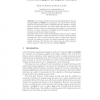ENTCS
2007
13 years 5 months ago
2007
Bialgebraic semantics, invented a decade ago by Turi and Plotkin, is an approach to formal reasoning about well-behaved structural operational specifications. An extension of alg...
KBSE
1995
IEEE
13 years 9 months ago
1995
IEEE
cation at some level of abstraction, abandoning the semantic information provided by the specification. In this paper, we propose a methodology that ships the overhead of formal re...
EURODAC
1990
IEEE
13 years 9 months ago
1990
IEEE
This paper discusses the selection of available components during high-level synthesis. We stress the importance of describing the behaviour of available components in some langua...
AMAI
2004
Springer
13 years 11 months ago
2004
Springer
The framework of algorithmic knowledge assumes that agents use algorithms to compute the facts they explicitly know. In many cases of interest, a logical theory, rather than a par...
IFL
2005
Springer
13 years 11 months ago
2005
Springer
In programs written in lazy functional languages such as for example Clean and Haskell, the programmer can choose freely whether particular subexpressions will be evaluated lazily ...
CEFP
2007
Springer
13 years 12 months ago
2007
Springer
This tutorial paper aims to provide the necessary expertise for working with the proof assistant Sparkle, which is dedicated to the lazy functional programming language Clean. The ...
ASM
2010
ASM
14 years 2 months ago
2010
ASM
The activities of formal modelling and reasoning are closely related. But while the rigour of building formal models brings significant benefits, formal reasoning remains a major...

